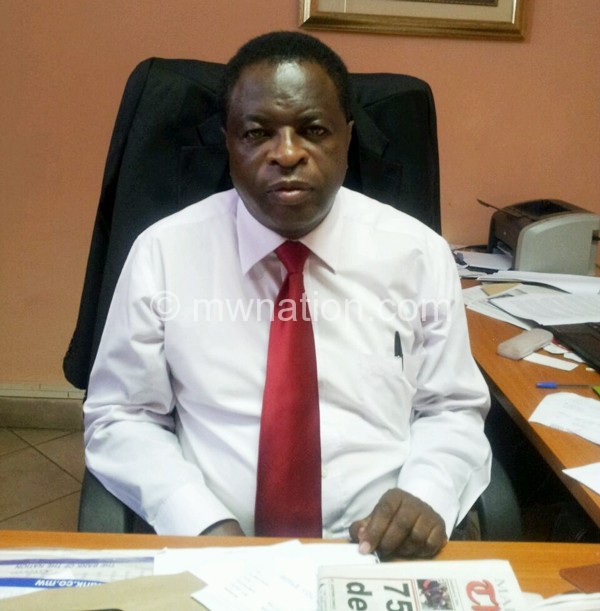Legend: Geoffrey Msampha, Versatile Chichewa football commentator
For anyone growing up when Malawi had only one radio station in the shape of Malawi Broadcasting Corporation (MBC), owning a radio was priceless.
There were moments that many could easily think that the radio practically controlled their lives. It was more than fashion in today’s world.

For instance, play among kids would usually be disrupted at the sound of the Zimene Mwatipempha signature tune; the instinct was saying it was lunch hour and the pangs of hunger would start biting with unrelenting violence.
But there was nothing magical like live football commentary. While Pearson Chunga was the master of the art in the Queen’s language, it was Geoffrey Msampha who used to communicate to the masses through Chichewa.
The two took five-minutes turns in their commentaries, but the illiterate masses were patient enough while Chunga run through his motions. They never minded missing the proceedings of the game in the English segment knowing they would easily join in once Msampha comes along within the next five minutes. After all, a goal alert is never missed during football matches irrespective of the language the commentary is in.
The football commentary was as lively. Those listening to the radio were as informed in every aspect because Pearson Chunga and Elias Kapangama were gems at their trade in English. Msampha was a household name in the 1990’s as far as Chichewa football commentary is concerned.
The idea of having commentary in Chichewa is fascinating especially to those who understand the language because they wonder how a commentator will translate regular terms like ‘the off side’ or a ‘left-arm spin’ and how it changes their perception of the game.
“One day there was a cup final and Pearson Chunga was on leave. MBC was unable to contact him for the game. Then the general manager, Mr. Henry Chirwa, approached me to help Elias Kapangama in the commentary by taking the English version. That was it. You see, I was writing sports reports before which were broadcast during sports programme,” he broke it down in an interview.
That alone was enough to propel Msampha to greater heights in football commentary.
“I could do both but the trend then was to have two people; I, therefore, chose Chichewa although my grammar is good in both languages. I am a product of a grammar school.
“As a Chewa born and bred, I took up Chichewa commentary after Elias Kapangama left MBC. In fact, I was doing both English and Chichewa sports commentaries. When Kapangama left I was doing Chichewa commentaries and when Pearson Chunga left, I was doing both until the late Patrick Masala came up, then I went back to Chichewa. Then Steve Liwewe Banda also came in,” he recollected.
Whoever Msampha was with in the commentary box, there was a clear on-air chemistry, bouncing jokes off each other constantly. Their chosen languages, too, were always complementary.
The idea of covering football matches live in a local language has been around for a while, but in Msampha, the platform had found, perhaps, its ideal proponent.
Football’s extensive lexicon is a miniature language all of its own, and can often appear almost opaque to non-followers. The challenge of conveying the unfolding action is doubled when one has to bring archaic English terms to life for a Chichewa audience with no direct footballing terms or references of their own.
The commentary in vernacular languages creates a platform for people to understand the beautiful game that has in the past been regarded as an elite sport
Illustrating his adaptability and versatility, for a decade and a half, Msampha also had a better share of being on radio for other programmes. Some of the famous programmes that people remember him by are International Crossroads, Spotlight on African, Newsroom Malawi, Tiyeni Tionenso and various sports programmes.
“My journey at MBC was good. It was not by fluke that I was into broadcasting because I liked current affairs and I do like it to date. I had wanted to do three things. I wanted to become a history teacher, physics or become a journalist and I came to settle for journalism and majoring in broadcast media,” he explained.
Talking about his voice, arguably a tool that has seen him to where he is and taken him places, he said: “The chemistry is simple; be humble and original. Do not imitate anyone, be yourself and people will judge you by that because there will be no one to compare with. People like Tony Kandiero, Late Brightson Kalilani and Patrick Khoza just to mention three inspired me.”
He joined MBC as a trainee in the newsroom and was later transferred to current affairs in the same news department.
“My journey ended up in the programmes department where I was in charge of performing arts and sports. However, I was forced out from MBC on 25 June 1999. I received a letter to that effect at 16.50 hours and no reason was given. The decision was challenged successfully,” said Msampha.
But all in all, working for state media is not easy, he says
“MBC has always been and will always be difficult to work for. Make no mistake, I enjoyed my work. Things will be good if the people there change their mentality. Yes, there are some who work to earn a living but there are others who believe in destroying others through politicians instead of proving themselves. This is the chronic disease there.
“I always tell them the profession is good but in Malawi you have to work for private companies, otherwise the state controlled media will always not let you free,” he affirmed.
Msampha hails from Chambwe Village in Traditional Authority Maliri’s area in Lilongwe.
When all is said and done, Msampha wants to be remembered as a person “who worked hard for my country. I put in more than 100 percent effort in my work.”
As partying words, Msampha, who now works as director of operations at Globe Internet Limited, says: “We need to pray hard so that one day those working in the state controlled media houses should be really free; they should not be his master’s voice. These days most broadcasters are not serious with their work. There are too many mistakes made because they relax too much. Broadcasters must make people trust their station and not as panel beaters of news stories. They should present both sides of the argument and let the listener make his or her own judgement.”





